外研版(2019)选择性必修第一册Unit 2 Onwards and upwards Developing ideas 课件(共31张PPT)
文档属性
| 名称 | 外研版(2019)选择性必修第一册Unit 2 Onwards and upwards Developing ideas 课件(共31张PPT) | 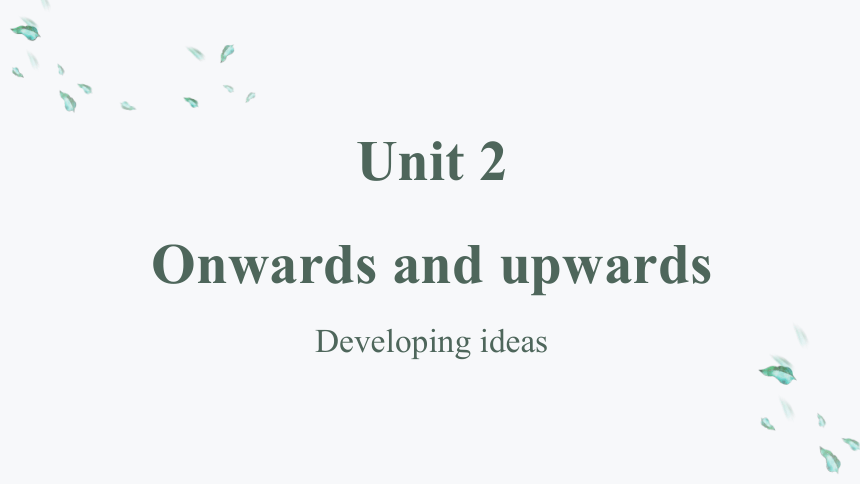 | |
| 格式 | pptx | ||
| 文件大小 | 5.3MB | ||
| 资源类型 | 教案 | ||
| 版本资源 | 外研版(2019) | ||
| 科目 | 英语 | ||
| 更新时间 | 2023-10-24 17:42:04 | ||
图片预览

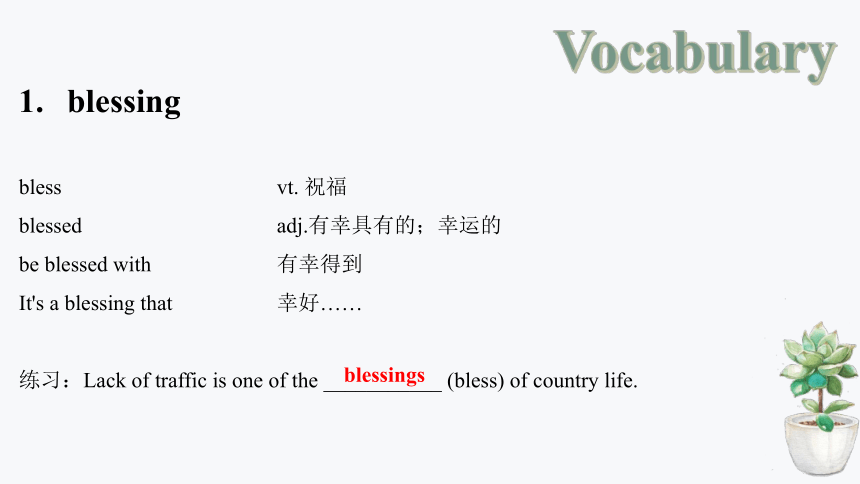
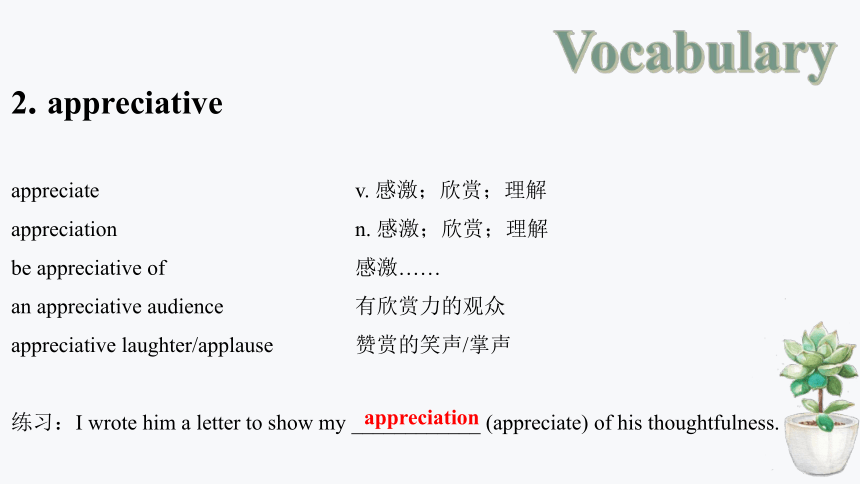
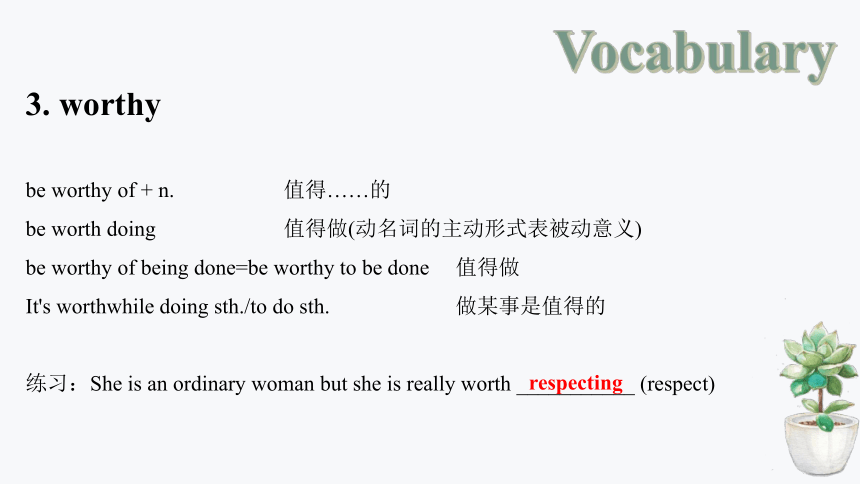
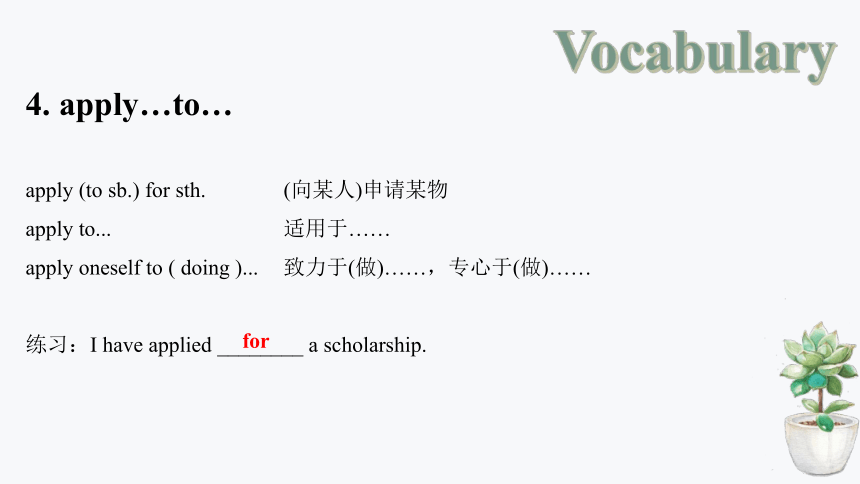
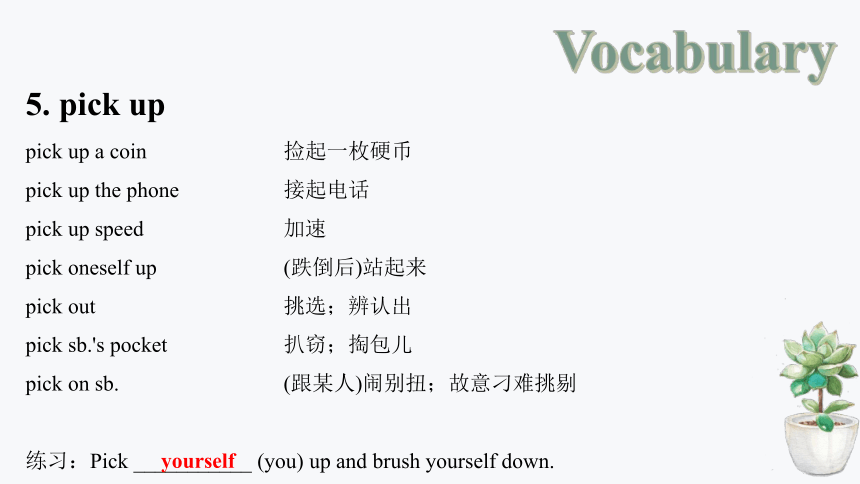
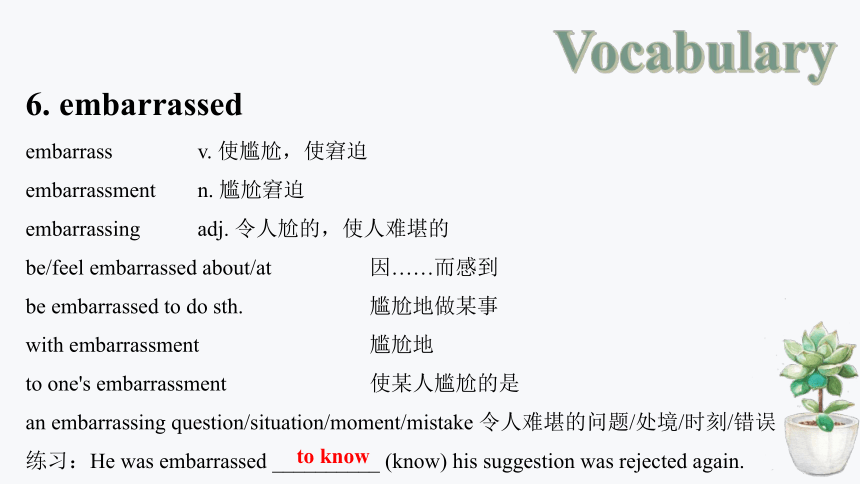
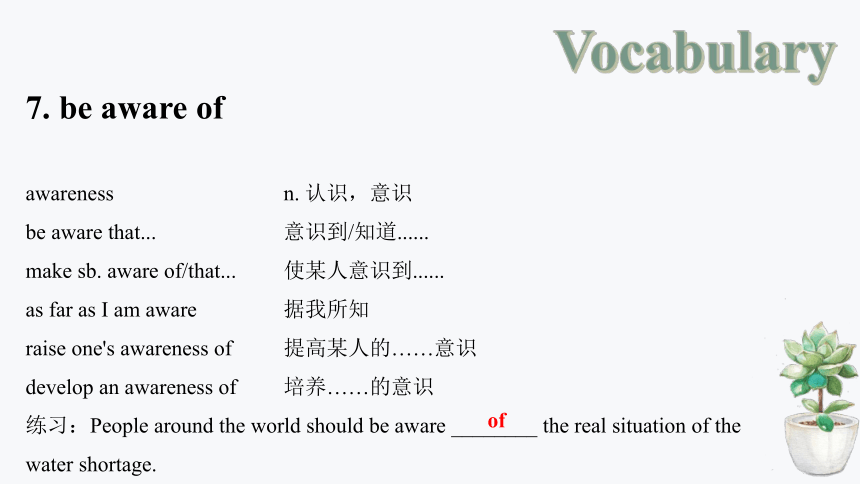

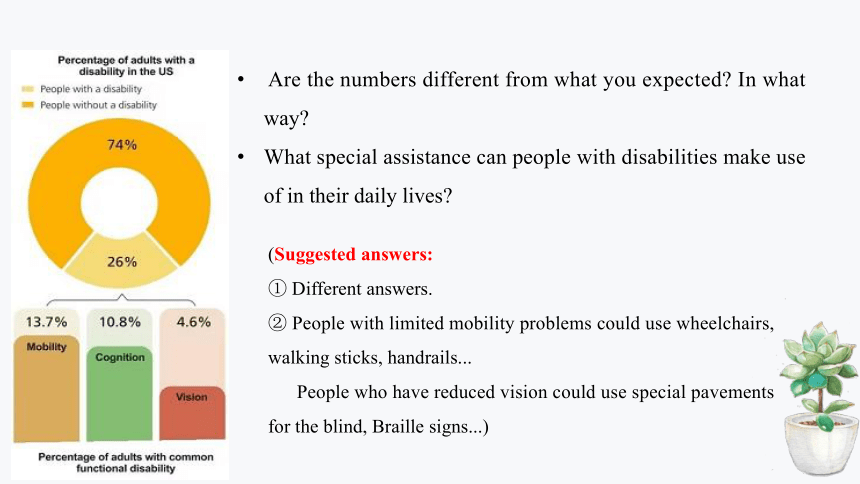
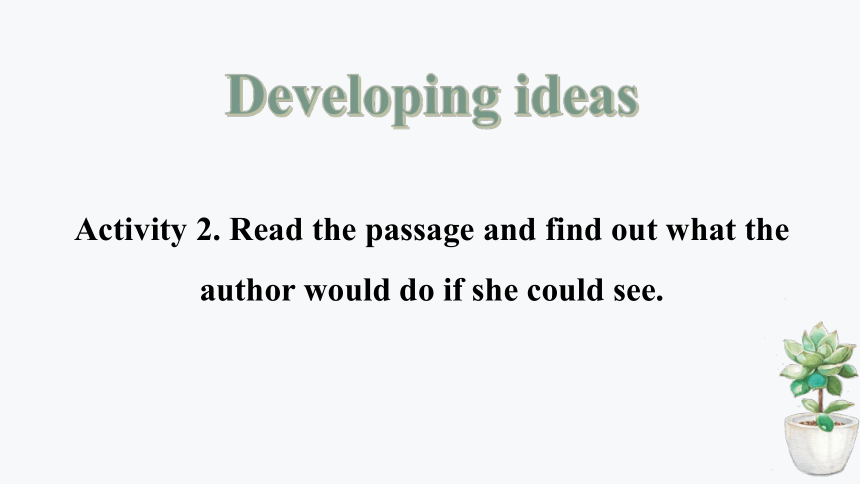
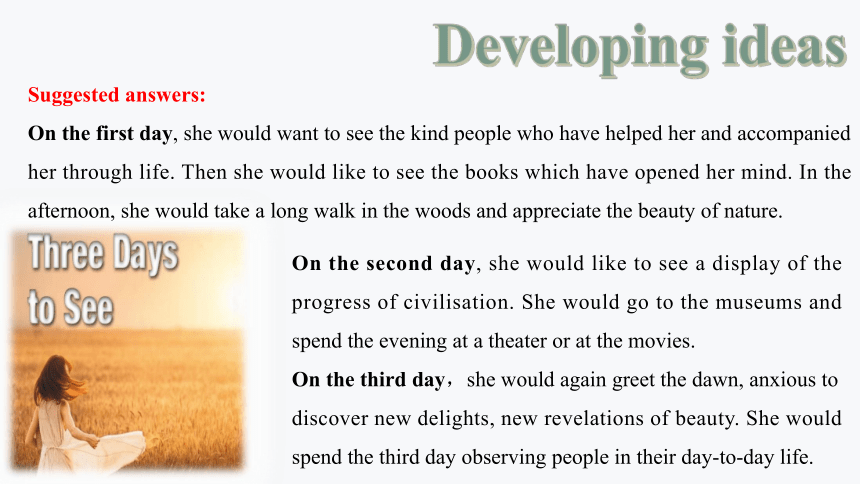
文档简介
(共31张PPT)
Unit 2
Onwards and upwards
Developing ideas
Vocabulary
blessing
bless vt. 祝福
blessed adj.有幸具有的;幸运的
be blessed with 有幸得到
It's a blessing that 幸好……
练习:Lack of traffic is one of the ___________ (bless) of country life.
blessings
Vocabulary
2. appreciative
appreciate v. 感激;欣赏;理解
appreciation n. 感激;欣赏;理解
be appreciative of 感激……
an appreciative audience 有欣赏力的观众
appreciative laughter/applause 赞赏的笑声/掌声
练习:I wrote him a letter to show my ____________ (appreciate) of his thoughtfulness.
appreciation
Vocabulary
3. worthy
be worthy of + n. 值得……的
be worth doing 值得做(动名词的主动形式表被动意义)
be worthy of being done=be worthy to be done 值得做
It's worthwhile doing sth./to do sth. 做某事是值得的
练习:She is an ordinary woman but she is really worth ___________ (respect)
respecting
Vocabulary
4. apply…to…
apply (to sb.) for sth. (向某人)申请某物
apply to... 适用于……
apply oneself to ( doing )... 致力于(做)……,专心于(做)……
练习:I have applied ________ a scholarship.
for
Vocabulary
5. pick up
pick up a coin 捡起一枚硬币
pick up the phone 接起电话
pick up speed 加速
pick oneself up (跌倒后)站起来
pick out 挑选;辨认出
pick sb.'s pocket 扒窃;掏包儿
pick on sb. (跟某人)闹别扭;故意刁难挑剔
练习:Pick ___________ (you) up and brush yourself down.
yourself
Vocabulary
6. embarrassed
embarrass v. 使尴尬,使窘迫
embarrassment n. 尴尬窘迫
embarrassing adj. 令人尬的,使人难堪的
be/feel embarrassed about/at 因……而感到
be embarrassed to do sth. 尴尬地做某事
with embarrassment 尴尬地
to one's embarrassment 使某人尴尬的是
an embarrassing question/situation/moment/mistake 令人难堪的问题/处境/时刻/错误
练习:He was embarrassed __________ (know) his suggestion was rejected again.
to know
Vocabulary
7. be aware of
awareness n. 认识,意识
be aware that... 意识到/知道......
make sb. aware of/that... 使某人意识到......
as far as I am aware 据我所知
raise one's awareness of 提高某人的……意识
develop an awareness of 培养……的意识
练习:People around the world should be aware ________ the real situation of the water shortage.
of
Lead-in
Activity 1. Look at the charts and answer the questions.
Are the numbers different from what you expected In what way
What special assistance can people with disabilities make use of in their daily lives
(Suggested answers:
① Different answers.
② People with limited mobility problems could use wheelchairs, walking sticks, handrails...
People who have reduced vision could use special pavements for the blind, Braille signs...)
Developing ideas
Activity 2. Read the passage and find out what the author would do if she could see.
Suggested answers:
On the first day, she would want to see the kind people who have helped her and accompanied her through life. Then she would like to see the books which have opened her mind. In the afternoon, she would take a long walk in the woods and appreciate the beauty of nature.
On the second day, she would like to see a display of the progress of civilisation. She would go to the museums and spend the evening at a theater or at the movies.
On the third day,she would again greet the dawn, anxious to discover new delights, new revelations of beauty. She would spend the third day observing people in their day-to-day life.
Developing ideas
Match the paragraphs to their main ideas.
Para. 1 A. Making best use of eyes can get much pleasure.
Para.2 B. What I will do with my good eyes on the first day
Para.3 C. Darkness would make one more appreciative of sight; silence would teach one the joys of sound.
Para.4 D. What I will do with my good eyes on the second day.
Para. 5 E. The author often tests what her seeing friends see.
Para.6 F. A blind person gives advice to normal people.
Para.7 G. What I will do with my good eyes on the third day.
Para.8 H. At midnight permanent night would close in on me again.
Developing ideas
Do Activity 3 on Page 28.
Choose the author's purpose in writing the passage and give your reasons.
① To help readers understand what it is like to be blind
② To make readers without disabilities appreciate what they have.
③ To persuade readers to care about the blind
Developing ideas
√
Do Activity 4 on Page 29.
Suggested answers:
A similar structure is used repeatedly. Namely, "Use...as if... Hear... as if... Touch... as if...". It is parallelism.
Suggested answers:
The use of parallelism in speech or writing allows speakers or writers to maintain a consistency within their work and creates a balanced flow of ideas. Moreover. parallelism can be used as a tool for persuasion.
Developing ideas
Developing ideas
Work in groups. Talk about your opinions on the sentence from the passage.
Do Activity 5 on Page 29.
Developing ideas
Do Activity 6 on Page 30.
Read the passage and answer the following questions:
(1) Why did the author go to the "dark restaurant"
(2) What difficulties did the author have during the meal
(3) How did the author feel after finishing the meal
Suggested answers:
Because the author wanted to understand the experience of being blind, thinking eating would be the most difficult activity.
a. The author knocked over glasses and dropped food.
b. The author ate much more slowly, trying to guess what was being eaten.
c. Pouring water was very difficult.
d. After failing to pick up any food with a fork for five minutes, the author decided to use hands, but stuck one hand into a bowl of warm, thick soup.
e. Even using a spoon, the author spilled most of the soup on his/her shirt.
The author left the restaurant feeling hungry, though much more aware of the challenges that blind people face.
Developing ideas
Do Activity 7 on Page 31.
Try to experience what it is like to have a disability and make notes.
①What kind of experience you had
__________________________________________________________________________________________________________________________________________
②What the most difficult thing was and why
__________________________________________________________________________________________________________________________________________
Developing ideas
Do Activity 7 on Page 31.
Try to experience what it is like to have a disability and make notes.
③How you overcame the difficulty
__________________________________________________________________________________________________________________________________________
④What you have learnt
__________________________________________________________________________________________________________________________________________
Now, write a short passage to describe your own experiences!
Developing ideas
Developing ideas
Presentation
Work in pairs. Make improvements to each other's passages and share them with the class.
写作思路(一审、二定、三明确、四分段)
(1)一审:确定写作体裁和主题体裁:
主题:描述经历
(2)二定:确定时态和人称(与体裁和主题息息相关)
(3)三明确: 明确写作要点:
①内容要求
②词数要求:80左右。
(4)四分段:(与写作要点息息相关)结合写作要点分段落。
Developing ideas
范文赏析
Para.1
Today in class, we played a game called "the blind traveler", in which one has to walk through some barriers with their eyes blindfolded. It is through this experience that I started to realise how inconvenient life could be for a blind person.
Developing ideas
范文赏析
Para.2
Not being able to see where l was going, I kept going off the path and turning in the wrong direction. What's more, without the ability to accurately locate the position of the barriers, l often fell over them, even though I was moving at an extremely slow speed. And a loss of balance increased the difficulty of this short journey. After falling over more than ten times, I finally reached my destination on hands and knees.
Developing ideas
范文赏析
Para.3
Without sight, I couldn't even complete this short journey of no more than 15 metres smoothly, let alone overcome all the other various difficulties in daily life. I do realise that life must be much more challenging for the blind people.
Developing ideas
Presenting ideas: Do Activity 1-4.
Read the two points of view and explain their meanings in your own words.
Developing ideas
Presenting ideas: Do Activity 1-4.
(2) Work in groups and decide which opinion you agree with more. Think of arguments to support your point of view and make notes.
Developing ideas
Presenting ideas: Do Activity 1-4.
(3) Prepare for a debate. Consider the following:
the roles and responsibilities for each member of your group
your arguments, opening and summary the opposing arguments you might face and how you can respond to them
useful words, expressions and structures
Developing ideas
Presenting ideas: Do Activity 1-4.
(3) Prepare for a debate. Consider the following:
the roles and responsibilities for each member of your group
your arguments, opening and summary the opposing arguments you might face and how you can respond to them
useful words, expressions and structures
(4) Team up with a group with the opposite point of view and hold the debate.
Developing ideas
Presenting ideas: Do Activity 1-4.
(3) Prepare for a debate. Consider the following:
the roles and responsibilities for each member of your group
your arguments, opening and summary the opposing arguments you might face and how you can respond to them
useful words, expressions and structures
(4) Team up with a group with the opposite point of view and hold the debate.
Developing ideas
Thank you!
Unit 2
Onwards and upwards
Developing ideas
Vocabulary
blessing
bless vt. 祝福
blessed adj.有幸具有的;幸运的
be blessed with 有幸得到
It's a blessing that 幸好……
练习:Lack of traffic is one of the ___________ (bless) of country life.
blessings
Vocabulary
2. appreciative
appreciate v. 感激;欣赏;理解
appreciation n. 感激;欣赏;理解
be appreciative of 感激……
an appreciative audience 有欣赏力的观众
appreciative laughter/applause 赞赏的笑声/掌声
练习:I wrote him a letter to show my ____________ (appreciate) of his thoughtfulness.
appreciation
Vocabulary
3. worthy
be worthy of + n. 值得……的
be worth doing 值得做(动名词的主动形式表被动意义)
be worthy of being done=be worthy to be done 值得做
It's worthwhile doing sth./to do sth. 做某事是值得的
练习:She is an ordinary woman but she is really worth ___________ (respect)
respecting
Vocabulary
4. apply…to…
apply (to sb.) for sth. (向某人)申请某物
apply to... 适用于……
apply oneself to ( doing )... 致力于(做)……,专心于(做)……
练习:I have applied ________ a scholarship.
for
Vocabulary
5. pick up
pick up a coin 捡起一枚硬币
pick up the phone 接起电话
pick up speed 加速
pick oneself up (跌倒后)站起来
pick out 挑选;辨认出
pick sb.'s pocket 扒窃;掏包儿
pick on sb. (跟某人)闹别扭;故意刁难挑剔
练习:Pick ___________ (you) up and brush yourself down.
yourself
Vocabulary
6. embarrassed
embarrass v. 使尴尬,使窘迫
embarrassment n. 尴尬窘迫
embarrassing adj. 令人尬的,使人难堪的
be/feel embarrassed about/at 因……而感到
be embarrassed to do sth. 尴尬地做某事
with embarrassment 尴尬地
to one's embarrassment 使某人尴尬的是
an embarrassing question/situation/moment/mistake 令人难堪的问题/处境/时刻/错误
练习:He was embarrassed __________ (know) his suggestion was rejected again.
to know
Vocabulary
7. be aware of
awareness n. 认识,意识
be aware that... 意识到/知道......
make sb. aware of/that... 使某人意识到......
as far as I am aware 据我所知
raise one's awareness of 提高某人的……意识
develop an awareness of 培养……的意识
练习:People around the world should be aware ________ the real situation of the water shortage.
of
Lead-in
Activity 1. Look at the charts and answer the questions.
Are the numbers different from what you expected In what way
What special assistance can people with disabilities make use of in their daily lives
(Suggested answers:
① Different answers.
② People with limited mobility problems could use wheelchairs, walking sticks, handrails...
People who have reduced vision could use special pavements for the blind, Braille signs...)
Developing ideas
Activity 2. Read the passage and find out what the author would do if she could see.
Suggested answers:
On the first day, she would want to see the kind people who have helped her and accompanied her through life. Then she would like to see the books which have opened her mind. In the afternoon, she would take a long walk in the woods and appreciate the beauty of nature.
On the second day, she would like to see a display of the progress of civilisation. She would go to the museums and spend the evening at a theater or at the movies.
On the third day,she would again greet the dawn, anxious to discover new delights, new revelations of beauty. She would spend the third day observing people in their day-to-day life.
Developing ideas
Match the paragraphs to their main ideas.
Para. 1 A. Making best use of eyes can get much pleasure.
Para.2 B. What I will do with my good eyes on the first day
Para.3 C. Darkness would make one more appreciative of sight; silence would teach one the joys of sound.
Para.4 D. What I will do with my good eyes on the second day.
Para. 5 E. The author often tests what her seeing friends see.
Para.6 F. A blind person gives advice to normal people.
Para.7 G. What I will do with my good eyes on the third day.
Para.8 H. At midnight permanent night would close in on me again.
Developing ideas
Do Activity 3 on Page 28.
Choose the author's purpose in writing the passage and give your reasons.
① To help readers understand what it is like to be blind
② To make readers without disabilities appreciate what they have.
③ To persuade readers to care about the blind
Developing ideas
√
Do Activity 4 on Page 29.
Suggested answers:
A similar structure is used repeatedly. Namely, "Use...as if... Hear... as if... Touch... as if...". It is parallelism.
Suggested answers:
The use of parallelism in speech or writing allows speakers or writers to maintain a consistency within their work and creates a balanced flow of ideas. Moreover. parallelism can be used as a tool for persuasion.
Developing ideas
Developing ideas
Work in groups. Talk about your opinions on the sentence from the passage.
Do Activity 5 on Page 29.
Developing ideas
Do Activity 6 on Page 30.
Read the passage and answer the following questions:
(1) Why did the author go to the "dark restaurant"
(2) What difficulties did the author have during the meal
(3) How did the author feel after finishing the meal
Suggested answers:
Because the author wanted to understand the experience of being blind, thinking eating would be the most difficult activity.
a. The author knocked over glasses and dropped food.
b. The author ate much more slowly, trying to guess what was being eaten.
c. Pouring water was very difficult.
d. After failing to pick up any food with a fork for five minutes, the author decided to use hands, but stuck one hand into a bowl of warm, thick soup.
e. Even using a spoon, the author spilled most of the soup on his/her shirt.
The author left the restaurant feeling hungry, though much more aware of the challenges that blind people face.
Developing ideas
Do Activity 7 on Page 31.
Try to experience what it is like to have a disability and make notes.
①What kind of experience you had
__________________________________________________________________________________________________________________________________________
②What the most difficult thing was and why
__________________________________________________________________________________________________________________________________________
Developing ideas
Do Activity 7 on Page 31.
Try to experience what it is like to have a disability and make notes.
③How you overcame the difficulty
__________________________________________________________________________________________________________________________________________
④What you have learnt
__________________________________________________________________________________________________________________________________________
Now, write a short passage to describe your own experiences!
Developing ideas
Developing ideas
Presentation
Work in pairs. Make improvements to each other's passages and share them with the class.
写作思路(一审、二定、三明确、四分段)
(1)一审:确定写作体裁和主题体裁:
主题:描述经历
(2)二定:确定时态和人称(与体裁和主题息息相关)
(3)三明确: 明确写作要点:
①内容要求
②词数要求:80左右。
(4)四分段:(与写作要点息息相关)结合写作要点分段落。
Developing ideas
范文赏析
Para.1
Today in class, we played a game called "the blind traveler", in which one has to walk through some barriers with their eyes blindfolded. It is through this experience that I started to realise how inconvenient life could be for a blind person.
Developing ideas
范文赏析
Para.2
Not being able to see where l was going, I kept going off the path and turning in the wrong direction. What's more, without the ability to accurately locate the position of the barriers, l often fell over them, even though I was moving at an extremely slow speed. And a loss of balance increased the difficulty of this short journey. After falling over more than ten times, I finally reached my destination on hands and knees.
Developing ideas
范文赏析
Para.3
Without sight, I couldn't even complete this short journey of no more than 15 metres smoothly, let alone overcome all the other various difficulties in daily life. I do realise that life must be much more challenging for the blind people.
Developing ideas
Presenting ideas: Do Activity 1-4.
Read the two points of view and explain their meanings in your own words.
Developing ideas
Presenting ideas: Do Activity 1-4.
(2) Work in groups and decide which opinion you agree with more. Think of arguments to support your point of view and make notes.
Developing ideas
Presenting ideas: Do Activity 1-4.
(3) Prepare for a debate. Consider the following:
the roles and responsibilities for each member of your group
your arguments, opening and summary the opposing arguments you might face and how you can respond to them
useful words, expressions and structures
Developing ideas
Presenting ideas: Do Activity 1-4.
(3) Prepare for a debate. Consider the following:
the roles and responsibilities for each member of your group
your arguments, opening and summary the opposing arguments you might face and how you can respond to them
useful words, expressions and structures
(4) Team up with a group with the opposite point of view and hold the debate.
Developing ideas
Presenting ideas: Do Activity 1-4.
(3) Prepare for a debate. Consider the following:
the roles and responsibilities for each member of your group
your arguments, opening and summary the opposing arguments you might face and how you can respond to them
useful words, expressions and structures
(4) Team up with a group with the opposite point of view and hold the debate.
Developing ideas
Thank you!
